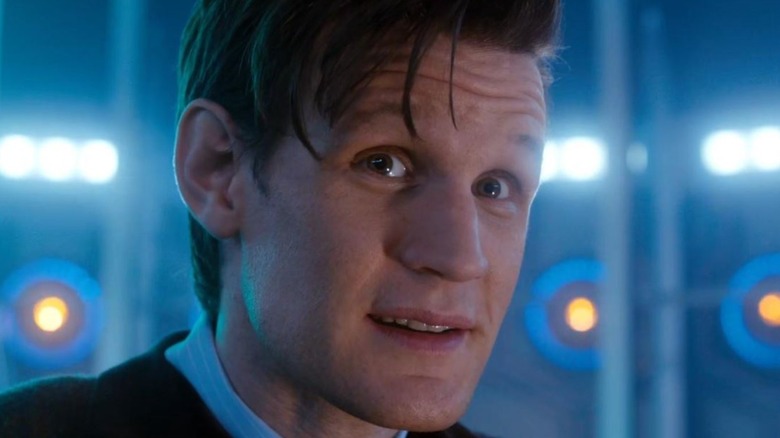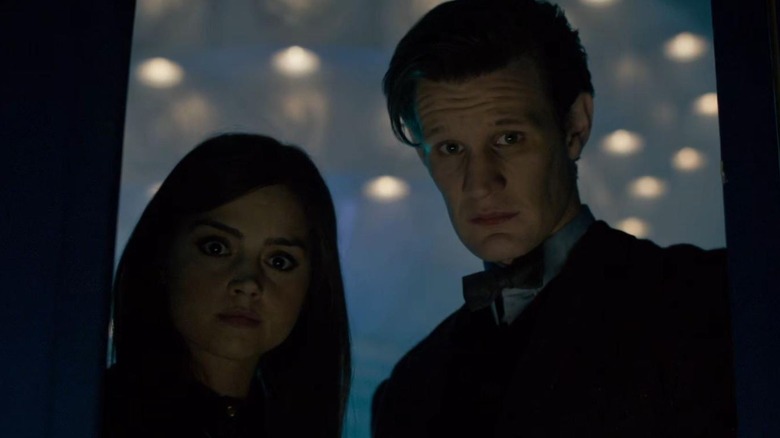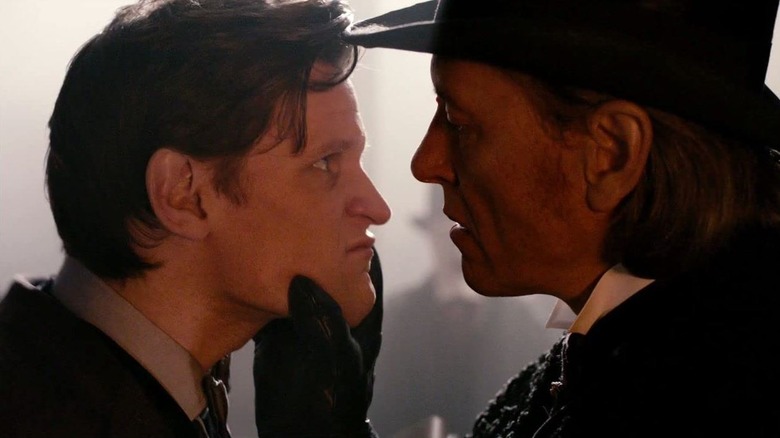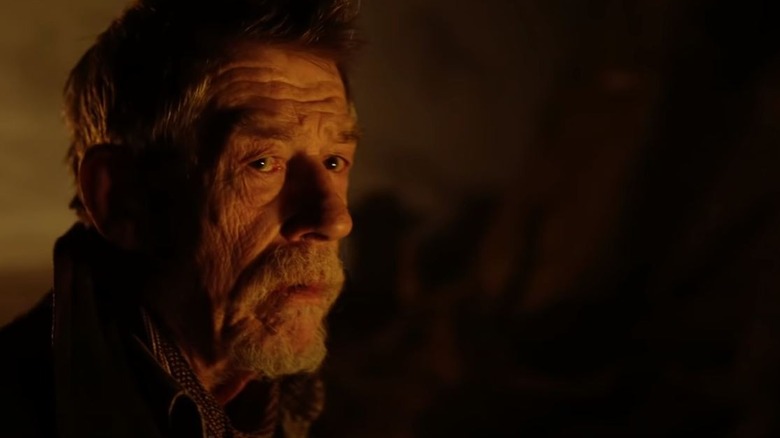The Ending Of Doctor Who Season 7 Explained
"Doctor Who" Season 7 has a lot going on. While there's still a bigger overarching plot unfolding over the course of the season, this particular series eschews the show's traditional tendency toward massive stories that unfold over multiple episodes. Instead, there's a ton of standalone plots, and the entire season is divided into two parts. There's also a whole constellation of supplemental mini-episodes, specials, and other materials to go through. What's more, Matt Smith's tenure as the Doctor is near its end, and the season reflects this with a looming sense of dread ... which isn't helped in the least by the fact that longtime companions Amy (Karen Gillan) and Rory (Arthur Darvill) dramatically exit the show in the mid-season finale.
It's all very fitting for the show's timey-wimey nature, but it also means that even the most ardent Whovian might find it difficult to keep track of everything that's happening. In order to keep things as clear as the circumstances allow — and to avoid spoilers for those who are yet to see the 2013 specials that truly conclude the Eleventh Doctor's story — this article will only discuss the series proper, which ends with "The Name of the Doctor." Let's take a closer look at the highly mysterious ending of "Doctor Who" Season 7.
The Impossible Girl explained
One of the biggest mysteries of "Doctor Who" Season 7 is new companion Clara Oswald (Jenna Coleman), a plucky and capable present-day woman who somehow exists in various times and places. In "Asylum of the Daleks," she's a resourceful space traveler called Oswin, who discovers to her shock that she's been turned into a Dalek. In the mid-season special, "The Snowmen," she returns as a barmaid from the year 1892, who befriends the Doctor and helps him battle the Great Intelligence (Ian McKellen) with tragic results.
Because of this, the Doctor dubs Clara the Impossible Girl, and it turns out that the similarity between the three versions of Clara is no coincidence. On Trenzalore, the returning Great Intelligence (now played by Richard E. Grant) unveils his plot to enter the Doctor's timestream and turn his life into one huge string of losses. Clara figures out how to cancel this by jumping in the stream herself, which creates endless echo Claras who help the Doctor in various stages of his life. Her ability to affect the Doctor's timestream in endless ways is similar to the leaf with infinite potential that she uses to defeat Akhaten earlier in the season. Indeed, the Doctor manages to rescue her using that very same leaf.
Though Clara's plan is a winning one, it's also pretty tragic. The Doctor has already witnessed two versions of her suffer horrific fates, and because she secretly fights the Great Intelligence's meddling in pretty much every single part of the Time Lord's lengthy timeline, it means "Asylum of the Daleks" and "The Snowman" are essentially just two of her countless battles. Judging by the fates she suffers in those episodes, it's chilling to imagine just how many times things end badly for her.
The title of the season finale comes with a twist
"The Doctor" is a name that the titular rogue Time Lord chose for himself, and it establishes his character as succinctly as possible: he might not always be nice, but ultimately, he's a healing force. "Doctor Who" has played with the concept of revealing the Doctor's true name on occasion, and the season finale's title, "The Name of the Doctor," is a pretty obvious hint that the show might finally reveal its greatest secret.
Of course, things are a bit more complicated than that, if only because the revelation would be pretty detrimental for a show that's literally called "Doctor Who." The Doctor is famously protective of his true name and has a massive array of fake ones, to the point that the Radio Times has compiled a lengthy list of his various aliases and leading theories about his true name. As such, when River Song (Alex Kingston) does utter the Doctor's true name to prevent the Great Intelligence from killing their friends, the audience doesn't actually get to hear this.
Then again, that particular revelation isn't the point of the episode at all. In the very end of "The Name of the Doctor," Eleven rescues Clara from his timestream, but not before encountering a mysterious figure from his past. Lurking in the depths of the Doctor's history is a secret, tormented incarnation who broke the promise that's right there in his chosen name. While the figure notes that he was forced to commit whatever atrocities he did, Eleven bluntly informs him that he didn't act in the name of the Doctor.
John Hurt's Doctor is a complex character with a complicated history
Apart from solving one major mystery and craftily dodging another, the ending of "Doctor Who" Season 7 also introduces a brand new one: a mysterious past incarnation of the Doctor (John Hurt) who's excluded from the numbered, "proper" incarnations.
This particular Doctor's story is further explored in the show's 50th anniversary special, "The Day of the Doctor." As such, we won't touch his storyline here to avoid spoilers. However, his behind-the-scenes backstory is pretty interesting in its own right. Per Radio Times, the character was originally supposed to be Christopher Eccleston's Ninth Doctor, whom showrunner Stephen Moffat intended to bring back for a special appearance. When Eccleston declined to reprise his role, Hurt's brand new version was created to take his place.
The creation of the new Doctor is an interesting move that adds a whole new, hitherto unknown chapter in the Doctor's storied history. His existence also means that Smith's Eleven is one regeneration further into his cycle than everyone thought, so he has no more regenerations left when his time comes. This creates its own interesting dilemma for the show's future.



